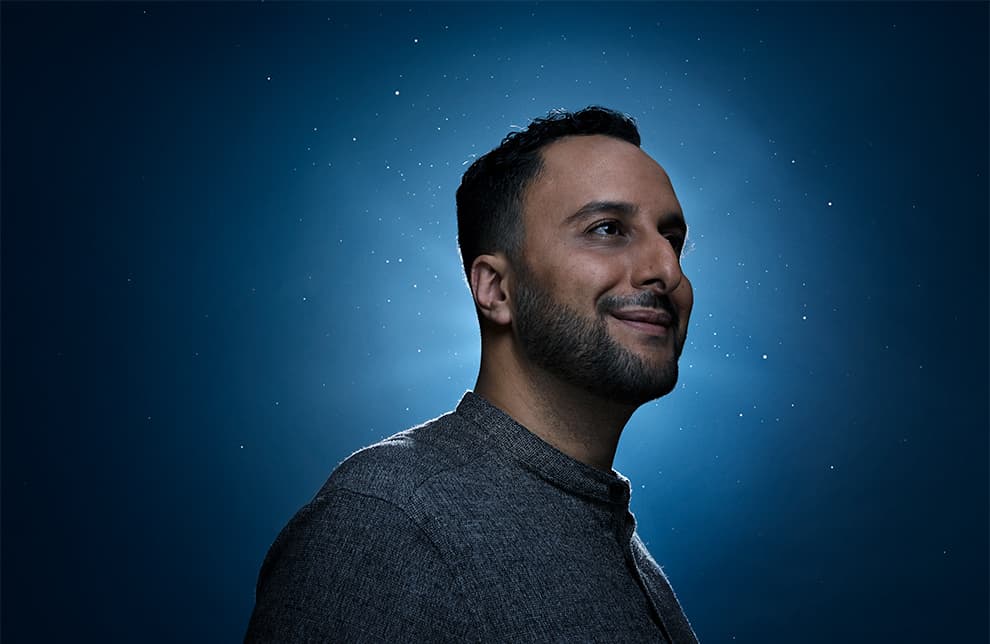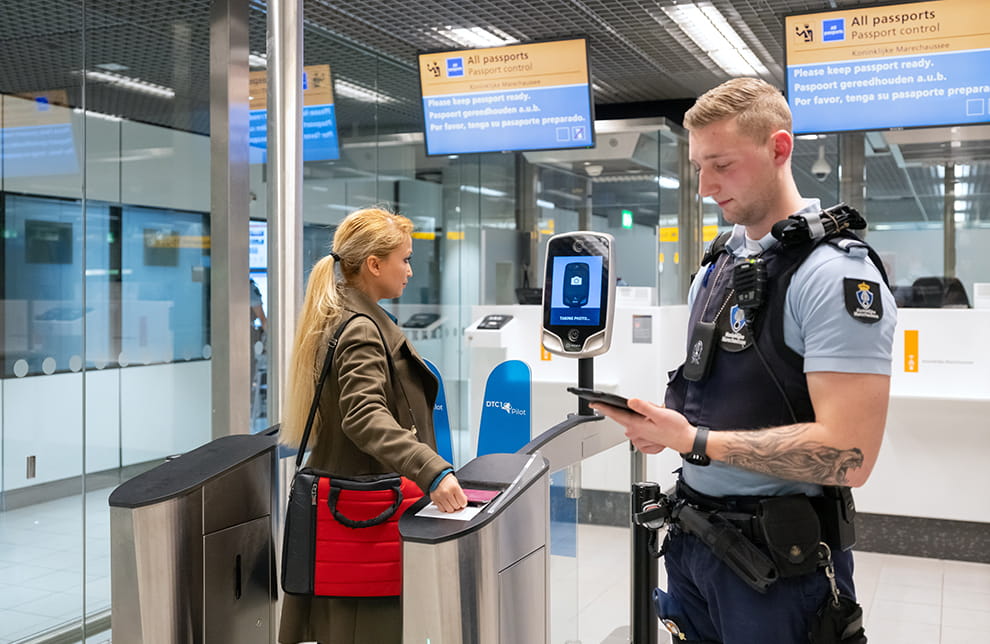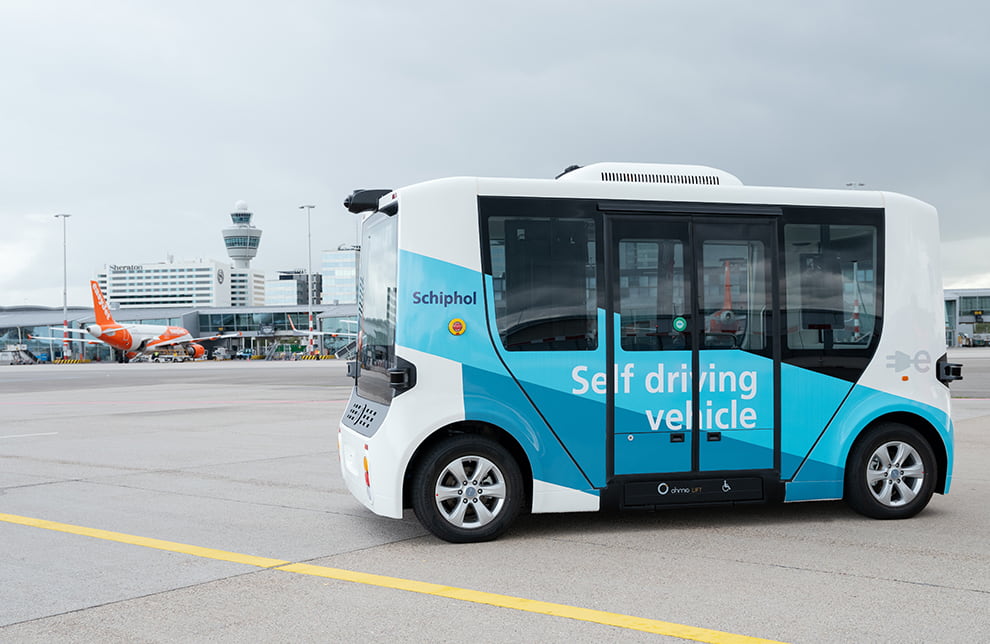Interview Hassan Charaf, Head of Innovation: ‘For Schiphol, innovation is absolutely essential’
Is innovation a fun game reserved for the happy few? Not at all. It’s serious business for everyone at Schiphol, including you. And if you’re thinking: but I wasn’t trained for that, was I? Then you’re wrong. ‘Anyone can innovate. Just let your creative juices and imagination flow. The good ideas will then come automatically.’ So, it’s time to set to work. Put your mind to the task, dream the dream and, above all, get involved.

In Vision 2050, we’ve set the bar high for ourselves. Our aim is to become the world’s most sustainable and high-quality airport. So how do we intend to achieve that? For Hassan Charaf, Head of Innovation since 1 June last year, the answer is clear: innovation is key. ‘And that’s what makes innovation at Schiphol so amazing,’ he says with enthusiasm. ‘You’re helping to build the airport of the future, contributing to achieving our ambitions.’
Passion
Charaf is no newcomer to the world of aviation. He’s already spent six years innovating at KLM. ‘Working there, I realised I really love aviation, but the airport is the part I like best. It’s the starting point of your journey, where your adventure begins. I also find the complexity of the airport fascinating. So many different players and processes are involved. What may look like chaos actually fits together perfectly, making it possible to get everything done every single day. This job brings my two great passions together: aviation and innovation. I’m a firm believer in innovation. It's essential for achieving a better future, so my daughter will still be able to make that dream trip to Bali when she grows up.’
Urgent
That better future is getting closer all the time. At Schiphol, we aim to be a zero-emissions airport by 2030 and we’re working with our partners in the sector to achieve a sustainable airport by 2050. ‘That just shows how urgent innovation is for Schiphol,’ says Charaf. ‘If we want to achieve zero emissions by 2030, things really have to change. Although many people may think that innovation is just a fun game for whizzkids, it's absolutely essential if we want to achieve our goals. Our ambition is to be a sustainable airport, offer an outstanding service to travellers and airlines, and keep our network in order. When you add to that the fact that traveller numbers are set to double in the coming decades and adding new buildings has to stop eventually, you realise that we face some major challenges. Innovation will be essential in tackling them.’
A lot of energy
The good news is that Charaf senses a lot of enthusiasm among the staff. ‘Large numbers of staff have already contacted the Innovation Hub because they want to become involved. The urgent need for Schiphol to become sustainable and for a different approach in order to achieve that is widely understood. I’m seeing a lot of energy throughout the organisation, which is great. And we really need each other’s knowledge and expertise because we have to find solutions together. Anyone can innovate. Just let your creative juices and imagination flow. The good ideas will then come automatically. Put your mind to the task, dream the dream and get involved. The aim of the Innovation Hub, which I manage, is to stimulate innovation. We do this with and on behalf of the entire Schiphol Group. This involves a lot of collaboration with other people, both internally and externally, and includes start-ups and knowledge institutes like Delft University of Technology. There’s also a lot of innovation going on at the regional airports, which serve as perfect testing grounds, because of their size.’
Six families
For Charaf, 2020 is set to be the year of implementation. ‘Last year, we outlined our strategy and we began implementation this year, determined to prove that it’s possible. Our strategy is in line with Vision 2050. We outlined six innovation themes, which we refer to as ‘families’: autonomous airside, new baggage concepts, digital identity, healthy living environment, new forms of transport and sustainable aviation. Every innovation we introduce fits into one of the families. For example, sustainable taxiing and research into synthetic fuel fit into sustainable aviation and air taxis and hyperloop are new forms of transport. All of them contribute to the state-of-the-art quality that Schiphol aims to achieve for the living environment, our network and our service.’
Earth-Moon-Mars
Countless innovations have already been initiated at Schiphol, but not all of them are in the same phase. ‘We’ve defined three types of innovation: Earth, Moon and Mars,’ explains Charaf. ‘Each has its own specific approach. Earth innovations are all about addressing problems for which we already know the solution. One example of that is Wilbur, our digital control tool that combines and structures data. This ensures that control has an increasingly better picture of the operational situation, identifies bottlenecks emerging in the system more rapidly and can take immediate measures. In the case of Moon innovations, we have a clearly-defined picture of what the future could look like, but require a voyage of discovery to find out how we get there. An example of this is the Brainport Business Line, in which travellers check in their cases at Eindhoven, but actually travel from Schiphol. We know it’s possible, but still need to explore how exactly to achieve it. We’re now setting up a pilot to find out. Finally, the Mars innovations. We know that these will radically change our future, but further research is needed in order to find out exactly how. Sustainable taxiing is an example of this. This spring, we will start this adventure with the arrival of Taxibot at Schiphol. But there are still so many answers we need to discover.’
Speed up innovation
Charaf is keen to emphasise that Schiphol is performing well when it comes to innovation. ‘We get a lot of visits from abroad and are seen as pioneers internationally. Innovation has always been part of our DNA. Many things that have now become mainstream at airports started out here. Our wayfinding process is one example of that. Visitors are always impressed by what we’re doing, but most of all by the fact that we’re doing it. But, in the years ahead, we will need to speed up on innovation if we want to achieve our ambitions. Do I have ambitions of my own? Certainly, I have plenty. But if Schiphol really is sustainable by 2030, if we manage to make that happen, I’ll be amazingly proud. And innovation will be part of that process, I’m convinced of that.’
Read the previous blogs
-
Tap and go with your Digital Travel Credential!
Published on:Can you board and cross the border faster with a digital travel document? At the request of the EU, we are testing a DTC together with the government and KLM.

-
Test capturing ultrafine particles with droplets
Published on:We are working diligently to reduce the amount of ultrafine particles. A possibility is the use of water droplets to remove ultrafine particles from the air.

-
Autonomous Bus Initiative
Published on:Our ambition: operating the world's most sustainable and top-tier airports by 2050. With this in mind we're putting autonomous buses to the test on airside.
